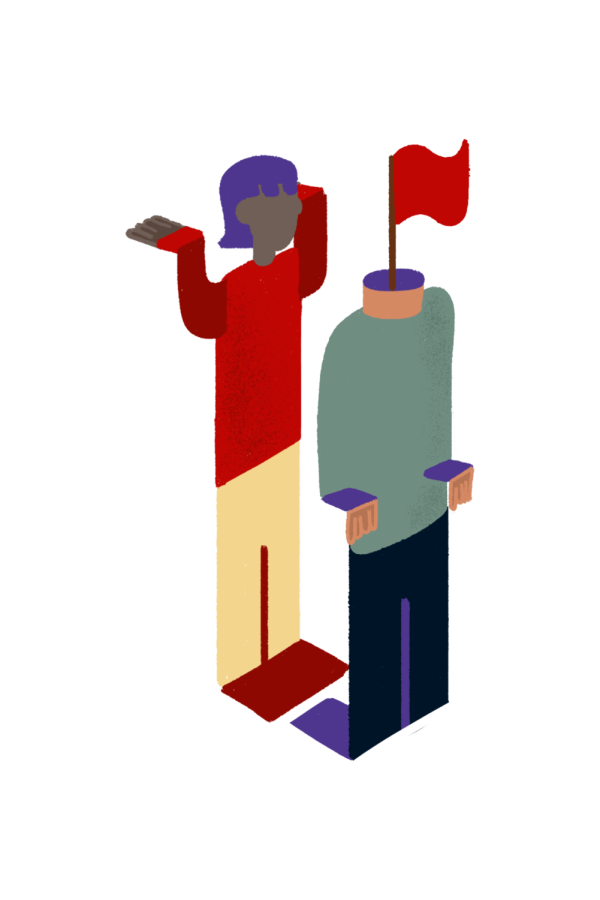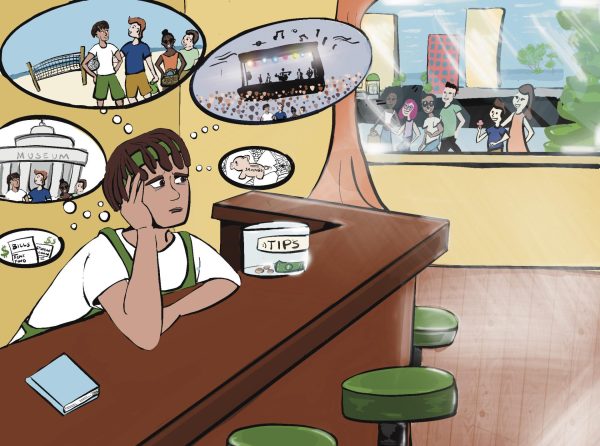Roses are red, but flags can be too
The red flag emoji made waves throughout social media in the fall of 2021. People jumped on the trend to hilariously share with the world their biggest deal breakers during social interactions. For example, tweets like “I like pineapple on my pizza” or “text slow but always on social media” were followed with a slew of red flag emojis.
Valentine’s Day is upon us and it’s time we revisit these sometimes silly, but often crucial little flags hinting at a potential character flaw. Whether you’re celebrating the holiday with a partner or dwelling on your perpetually single livelihood, our dating lives could all benefit by knowing what to look out for.
Being safe online
The current dating environment exists almost exclusively online and on apps. It’s easier and greatly expands our selection. Leah Sefor is known as South Africa’s go-to life and relationships expert. According to her bio she “has worked with individuals, couples and organizations in over 10 countries for more than 26 years as a life, relationships and communications specialist.” I talked to her a bit about the dating scene today.
In terms of online dating, Sefor says that “being too open and overly willing to give strangers the benefit of the doubt might help you to meet more people .. but that behavior might also blind you to unhealthy red flags that could be waving right in front of you.” Some of Sefor’s online dating red flags are:
- Lots of negatives in their profile (“I don’t want” or “I’m not in to”)
- Vague profile photos (hiding their face) or no bio
- Asking for money
- Breaking agreements
- Talking about their ex… they are not over them or ready to welcome someone new into their life
- Bio has sexist, racist or derogatory language
- The way they behave doesn’t match up with their profile, presenting inconsistent personas
There’s also importance to research before meeting someone in person. DePaul senior Mason Abernethy said “I know that everyone does this and doesn’t want to admit… I search the girl up on Instagram… and try to figure out her interests and whatnot.” This is a way to ensure the person is not catfishing you or showing incongruent behaviors as Sefor notes above. But for Abernethy, his curiosity tends to outweigh his skepticism.
“Personally, I’ve never had a time where I didn’t meet up with someone because of their red flags… I’ve just been too curious to figure out who they were,” he said. There’s certainly differing levels of caution between men and women in the world we live in.
“The golden rule is this: If something doesn’t feel right, trust your gut!” Sefor said. If you’re feeling spontaneous, just make sure you’re meeting in a public setting and keeping yourself safe.
Don’t forget green flags
When the red flag trended on social media, many decided to flip the script and post their green flags, or things they look for in a partner. In a Twitter poll, there was a mixed reaction with 47.1 percent saying they look for both, 29.4 percent only look for red flags while 23.5 percent only look for green flags.
“When I’m looking for a relationship, I think I tend to focus more on the green flags at first,” DePaul junior Linder Bozeman said. “As the relationship develops, the red flags ultimately show themselves and it forces me to look at them.”
Sefor said we should “seek to find a balanced view.” She said “looking for the positives or green flags is incredibly important to know if you are compatible and your values align.”
Some of her most vital green flags to watch for are:
- Giving their full undivided attention in conversations
- They respect your boundaries
- They want you to meet their friends and family once the relationship is serious
- They listen and validate your feelings
- They’re open to honest conversations without getting defensive
- They operate with integrity, keeping agreements and showing up when and how they say they will
Don’t let your relationship blind you
Getting into a relationship nowadays can be incredibly difficult, so we tend to let our guards down when we find our “person.”
“The problem in a long term relationship is that when the toxic behavior starts, you don’t want to believe it, so you find ways to rationalize what’s going on,” Sefor said.
In another Twitter poll asking if people in a relationship still look for their partner’s red flags, 30 percent said they do not. Sefor has advice for those who are currently off the market:
- Don’t make excuses for toxic behavior
- Stop ignoring the discomfort in your body when your partner is doing or saying something that is not OK for you.
- If they keep ignoring your needs and boundaries, it’s time to leave
- Gaslighting
- Psychological or physical abuse
“It helps to have a partner that is very understanding and patient,” Bozeman said. Again, Sefor’s advice of trusting your gut remains consistent in this situation as well.
The outsider’s responsibility
Oftentimes, we find ourselves on the outside of a friend, family member or coworker’s relationship. We hold a position of responsibility when it comes to ensuring our loved ones safety and wellbeing. She has some tips to look out for:
- Controlling behavior (financial, time spent with friends or family, location tracking, etc.)
- They’re financially entangled with no support from their partner
- When their physical health is straining (not eating properly, sleeping well, or exercising)
- Significant shift in self-esteem or confidence
- Always nervous about upsetting their partner, making excuses
- Signs of physical abuse (suspicious bruises/broken bones/split lips, hiding injuries with clothing that doesn’t match the weather)
- Talking about suicide, “not wanting to be here anymore,” or “wishing there was a way out”
Sefor said it’s important for those in potentially volatile relationships to listen to those around them. “No one knows you as well as your family and closest friends… when they’re voicing concern about your relationships and changes that they’ve seen in you, don’t get defensive — listen, because you may be too far in to see what’s really happening,” she said.
If this is happening to someone you love, Sefor advises you to “find a way to separate them from their partner… address your concerns… offer to help them walk away… call the police if it’s serious… take action before it’s too late.”













Lynn Calvert • Feb 15, 2022 at 11:20 am
Navigating the development of personal relationships is a challenge. When the initial phase of the journey is in cyberspace effective use of the proposed analytic approach offers the promise of positive outcomes when the journey reaches terra ferma and the face to face phase.
Karen Baker • Feb 14, 2022 at 4:49 pm
These are really good, clear strategies for becoming aware of someone’s negative traits (red flags) and their wholesome, attractive traits (green flags). In today’s technology-driven, fast-paced environment it is well worth the investment of time to develop a true, strong connection with someone whom you want to spend time…perhaps the rest of your life.